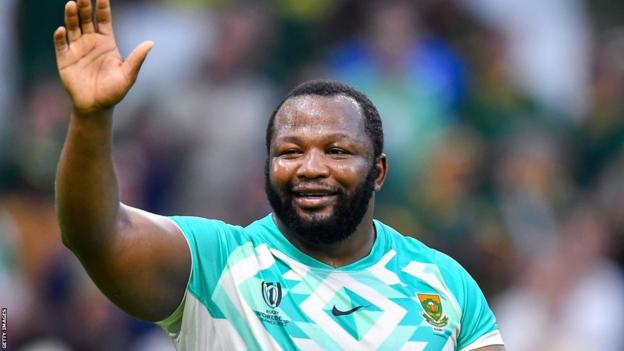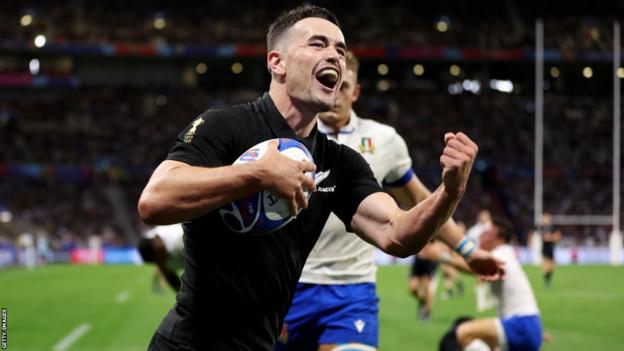This website uses cookies so that we can provide you with the best user experience possible. Cookie information is stored in your browser and performs functions such as recognising you when you return to our website and helping our team to understand which sections of the website you find most interesting and useful.

| Venue: Stade de France, Paris Dates: Saturday, 28 October Kick-off: 20:00 BST |
| Coverage: Commentary on BBC Radio 5 Live, plus text updates on the BBC Sport website and app. |
Back in 2007, the last time the Rugby World Cup was held in France, England came into the final fuelled by an unlikely team anthem.
Sixteen years on, and it is the Springboks, rather than their opponents, who have weighed up holding or folding and decided instead to push all their chips into the middle.
When South Africa's team selection landed on Thursday morning, it was not the decision to rip out and replace the half-back partnership - normally a call that would have dominated discussion - that seemed brave.
Instead it was the balance of the bench. Willie Le Roux is on one end - the only back riding the pine - while the other is weighed down with seven forwards.
In 1968 when replacements were first introduced to rugby, they existed in case of injury.
South Africa's subs have been selected in spite of the risk of injury.
In the most influential positions on the pitch, they have no specialist cover.
Faf de Klerk is the only scrum-half in the matchday squad. Handre Pollard is the only fly-half. There is no ball-carrying midfield option should Damian de Allende or Jesse Kriel go off. Even among the forwards, they are relying on a 37-year-old back-rower - Deon Fourie - dredging up hooking skills he thought he had left behind years ago to cover the number two shirt.
It was extraordinary when South Africa did similar against Ireland in the pool stage. Then it was seen as a throw-away show of strength, in a game the Springboks could afford to lose.
On the biggest stage, in the highest-stake game, in the modern destruction-derby era though, it is bold, bordering on reckless.
The risks are massive. The contingencies - Cheslin Kolbe reprising a scrum-half role he last played on the Sevens circuit, full-backs Le Roux or Damian Willemse stepping into fly-half, back row Kwagga Smith covering the outside backs - increasingly outlandish.
If things go wrong, whether through indiscipline or injury, the chaos could compound. Perhaps not to the levels of mayhem seen when Italy picked flanker Mauro Bergamasco at scrum-half at Twickenham in 2009, but more than enough to be exploited by a team as good as the All Blacks.
"It is not a 10-minute discussion, it is hours and hours," said South Africa head coach Jacques Nienaber of how he and his backroom staff made their call.
The risk does not come without potential reward though. There is a big upside that has lured South Africa into leaving themselves so vulnerable.
Their strength in depth up front can squeeze the life out of opponents late on as they clear the bench and top up the on-pitch power.
Across three second halves of rugby against Ireland, France and England in this tournament, they have conceded just 15 points and no tries.
Whatever attacking gears New Zealand might have, they may not be enough to find a way clear of second-half quicksand that swallows up opposing set-piece, rhythm and momentum.
The suspicion is that New Zealand need to get out to a fast start; open up clear water on the scoreboard and leave the 'finishers' - as Eddie Jones liked to term them - with too much on their plates.

South Africa have conceded the first points in each of their past three matches.
Against France in the quarter-finals, a trio of smash-and-grab first-half tries, brilliantly seized, but set up by errors from the hosts, kept them from being blown away.
Against England in the semis, they left it dangerously late, making up a nine-point gap in the final 11 minutes.
New Zealand have been the most ruthless points-scoring machine in the tournament - returning with an average of almost four points from every incursion over the opposition 22m.
If they can keep up that hit-rate in the final and then hunker down and withstand the blast from the Bok bench, it may be them, rather than South Africa, that claims a record fourth World Cup.
"It would be good to take some gas out of that bomb, wouldn't it?" agreed All Blacks forwards coach Jason Ryan as he contemplated the Springbok's fabled 'Bomb Squad' replacements.
The pyrotechnics are unavoidable though. South Africa and New Zealand are two powerhouses who combine the ballistic and balletic to give this tournament the crescendo it deserves.
It hasn't been a perfect World Cup. A bloated schedule that started in 32C summer heat and will finish in the sodden depths of autumn is first on World Rugby's list of fixes.
But it has delivered drama by the bucketload.
Five of the six knockout matches so far have been in balance with the clock in the red, after a pool stage which delivered thrilling upsets and heavyweight clashes.
A finely balanced, blue-chip final, spiced with leftfield tactics, is a fitting final round.



 Africana55 Radio
Africana55 Radio 
